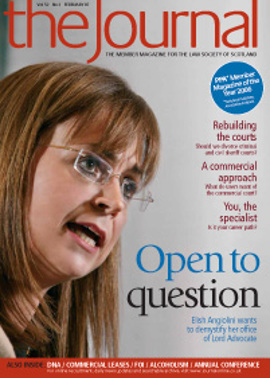Views from the new boy

Of course, we all know what happened to Lewis and his canoeing buddies...
However, for the rest of us engagement with risk is an unavoidable fact of our personal and business existences, and if we’re wise we seek to mitigate or control that risk wherever and however we reasonably can – especially in the legal profession, where the consequences of error or failure to provide a satisfactory level of service, while not a matter of life and death, can still be serious and costly.
I was going to start this paragraph “As a newcomer to risk management myself…”, but then I realised that in my 14 years in the legal profession, as in my ordinary life, I have been practising risk management (RM), only without calling it that, since day one. We all do, to a greater or lesser extent. Diarising appointments and important deadlines, carrying out proper money laundering checks, avoiding conflicts of interest, just remembering to look both ways before crossing the road, are all forms of elementary risk management – recognising and dealing with risk – in our everyday lives.
More complex, more risky
From a personal perspective, the risks I encountered in private practice tended to involve clients with unreasonable, or unstated, expectations; the difficulty of scoping some clients’ instructions correctly and keeping these current; and not always being able to obtain instructions when these were required. Problems also occasionally arose with clients who, for whatever reason, weren’t always entirely open. I’ll be writing more about managing risks specific to my field of IP/IT at a later date.
While it is particularly important for members of the legal profession in Scotland to manage the risks inherent in their chosen field, they are by no means alone in the need to do so.
And it’s official: the world really is getting to be a more complex place, and as it gets more complex it also gets riskier – there’s more to go wrong. With the advantages of instant worldwide communication and the globalisation of business come the downsides of, among other things, data loss, cyber-crime, identity theft and vulnerability to business interruption through a range of threats to business continuity, either technical or from the natural world.
Stir into this mix the 21st century’s very own new dangers – climate change and global terrorism – and you will probably agree that risk management has its work cut out for the foreseeable future (such as it is foreseeable, these days).
Not all negative
Many of you will remember the speech Tony Blair made in May 2005 on risk and the “compensation culture”. Indeed, the threat posed to the legal profession by the much remarked upon rise in litigiousness, and deliberately devious, dishonest or vexatious clients is an undeniable feature of the new environment with which Scottish solicitors and their RM advisers have to deal.
But it’s not all downside and danger. The other side of the risk coin is opportunity (indeed RM professionals sometimes refer to opportunities as “positive risks”, while the more usual understanding of the term “risk” – i.e. a threat, the possibility of something bad occurring – they characterise as a specifically “negative risk”). The Prime Minister, in his May 2005 speech, spoke about the opposing danger which excessive risk awareness, or risk aversion, poses to business and innovation by stifling creativity and deterring business people from taking the (calculated) risks which are an inevitable facet of all entrepreneurial endeavour.
The risk which ineffective or badly applied risk management can itself ironically entail is the encouragement among businesses of the application of the so-called “precautionary principle” – “do nothing and nothing bad can happen”, or to put it in a more workplace context “No-one ever got sacked for saying ‘No’”. After all, runs this Luddite argument, even the record company executive who famously passed up the opportunity of signing The Beatles at an early stage of their career (“Sorry lads, groups with guitars are on the way out”, he is alleged to have told the embryonic Fab Four) did not lose his job as a result. Well, yes, but he was known for the rest of his career as the guy who caused his company to miss out on the recording deal of the century, which many would think is punishment enough!
Cost and benefit
So the trick of commercially sensible risk management, as I see it, is to install and operate procedures to minimise unavoidable business risks but without, in doing so, imposing uneconomic or impractically bureaucratic processes which burden the very business that they are intended to protect. An extreme example of such counterproductive RM was quoted recently by the author Michael Bywater in his book Big Babies. According to him, more helicopter pilots have been killed practising emergency landings than actually making them.
Risk management should encourage firms to identify and quantify risks affecting their business, in all its aspects, and to address these risks by formulating practical responses to them, while also allowing an informed and businesslike acceptance of reasonable risk where this involves the potential for proportionate commercial reward and the development of the business. Good risk management, in other words, is good business; and though we may be lawyers, we are first and foremost business people. As the Financial Times writers Eamonn Kelly and Steve Weber wrote in their “Mastering Risk” articles in 2005, “When advantage lies mostly in the unknown and the uncertain, the ability to sense and learn faster, to correct mistakes and drop losing bets, to tolerate ambiguity and live with, even embrace, ambivalence, becomes absolutely essential… Loss aversion is not a way to win… re-embrace risk as a source of advantage.”
As a new starter at Marsh, one of the many things which have struck me is the range of RM services which Marsh provides to the Law Society of Scotland and to the profession. If you’re unaware of these as I (until recently) was, I can tell you they include:
risk management advice and training, including articles like this one, materials for the annual Risk Management Roadshows and, in the year ahead, RM sessions in the Terms of Engagement Roadshow events;
- RM sessions at the Society’s Annual Conference;
- RM sessions at practice management courses;
- running of workshops and seminars at Update events, faculties and firms;
- provision of training as part of the Diploma in Legal Practice at various universities;
- carrying out web-based and other types of risk survey;
- RM sessions at the Aberdeen University and WS Society professional competence courses;
- publishing guidance on the solicitors’ micro-site on the Marsh website (www.marsh.co.uk/lawsociety);
- risk management consultancy services, including strategic risk assessment projects;
- analysis of trends in claims experience;
- identifying emerging risks;
- issuing occasional risk alerts on specific subjects of urgent concern to the profession;
- individual advice to law firms on the cover available under the Master Policy, filling in proposal forms on annual renewal, etc;
- a programme of mini-seminars for individual firms on a variety of topics.
And even that’s not all. In the next few weeks Marsh will be making available to the profession on its website a suite of interactive e-learning modules covering all aspects of risk management as it affects the conduct of private practice legal business in Scotland.
Paddle together
At the start of this article I mentioned my time in private practice. During this period I was lucky enough to work in firms of widely differing sizes and in locations as diverse as Dundee, Forfar, St Andrews and Edinburgh. It’s gratifying, as well as slightly sobering, for me to imagine that these words are being read by lawyers in all these places, and elsewhere, with whom I have worked, who are even now saying to themselves, “Oh, I remember Stuart – I’ve wondered what became of him… and that fiver he owes me.” Well, I’m hoping that my being able to draw on that breadth of experience will help me to make my advice to the Society and the profession at large in my new capacity equally relevant and useful for firms of all sizes across the country.
So even if, like Lewis and his pals, you’re paddling your own canoe, we at Marsh are here to help you be prepared for whatever may be waiting around the next bend of the river.
STUART SKELLY AND MARSH
Stuart Skelly is a former solicitor in private practice who works in the FinPro (Financial and Professional Risks) National Practice at Marsh, the world’s leading risk and insurance services firm. To contact Stuart, email: stuart.skelly@marsh.com.
The information contained in this article provides only a general overview of subjects covered, is not intended to be taken as advice regarding any individual situation and should not be relied upon as such. Insureds should consult their insurance and legal advisers regarding specific coverage issues.
Marsh Ltd is authorised and regulated by the Financial Services Authority.
In this issue
- Routes to qualification: the Italian picture
- Speaking of change
- Disabled from suing?
- Hearing and answering
- Court afresh
- Clean sheet at the Commercial Court
- Making a specialism pay
- LCN DNA - devil in the detail
- To buy or not to buy?
- Just a winter warmer?
- Views from the new boy
- Working out time
- A claim in trust
- Incapable of dismissal?
- Chasing debts made simple?
- Scottish Solicitors' Discipline Tribunal
- Website reviews
- Book reviews
- FOISA goes to court
- On the wrong track?






